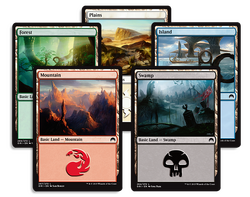Slow land: Difference between revisions
No edit summary |
>Occotwitch m (Updated "comes into play" to "enters the battlefield".) |
||
| Line 1: | Line 1: | ||
'''Slow lands''' is a term that refers to a [[cycle]] of [[uncommon]] [[lands]] that can be tapped for {{C}} or one mana of two [[allied color]]s; if [[tapped]] for [[colored]] [[mana]], they do not [[untap]] during their controller's next [[untap step]]. The [[drawback]] is significant compared to [[taplands]]; slow lands give an advantage exactly the turn drawn but will cost a mana every second turn | '''Slow lands''' is a term that refers to a [[cycle]] of [[uncommon]] [[lands]] that can be tapped for {{C}} or one mana of two [[allied color]]s; if [[tapped]] for [[colored]] [[mana]], they do not [[untap]] during their controller's next [[untap step]]. The [[drawback]] is significant compared to [[taplands]]; slow lands give an advantage exactly the turn drawn but will cost a mana every second turn, whereas [[taplands]], which enter the battlefield tapped (costing one mana, once), are dual lands every point after that. | ||
==List of Slow Lands== | ==List of Slow Lands== | ||
Revision as of 16:21, 11 May 2020
Slow lands is a term that refers to a cycle of uncommon lands that can be tapped for ![]() or one mana of two allied colors; if tapped for colored mana, they do not untap during their controller's next untap step. The drawback is significant compared to taplands; slow lands give an advantage exactly the turn drawn but will cost a mana every second turn, whereas taplands, which enter the battlefield tapped (costing one mana, once), are dual lands every point after that.
or one mana of two allied colors; if tapped for colored mana, they do not untap during their controller's next untap step. The drawback is significant compared to taplands; slow lands give an advantage exactly the turn drawn but will cost a mana every second turn, whereas taplands, which enter the battlefield tapped (costing one mana, once), are dual lands every point after that.
List of Slow Lands
The slow lands were first introduced in Tempest .
- Thalakos Lowlands (
 /
/ )
) - Rootwater Depths (
 /
/ )
) - Cinder Marsh (
 /
/ )
) - Mogg Hollows (
 /
/ )
) - Vec Townships (
 /
/ )
)
They were later functionally reprinted in Champions of Kamigawa.
- Cloudcrest Lake (
 /
/ )
) - Waterveil Cavern (
 /
/ )
) - Lantern-Lit Graveyard (
 /
/ )
) - Pinecrest Ridge (
 /
/ )
) - Tranquil Garden (
 /
/ )
)
Ice Age depletion lands
The depletion lands from Ice Age work essentially like slow lands, but with the potential to influence the drawback by adding or removing depletion counters. They are allied-colored as well.
